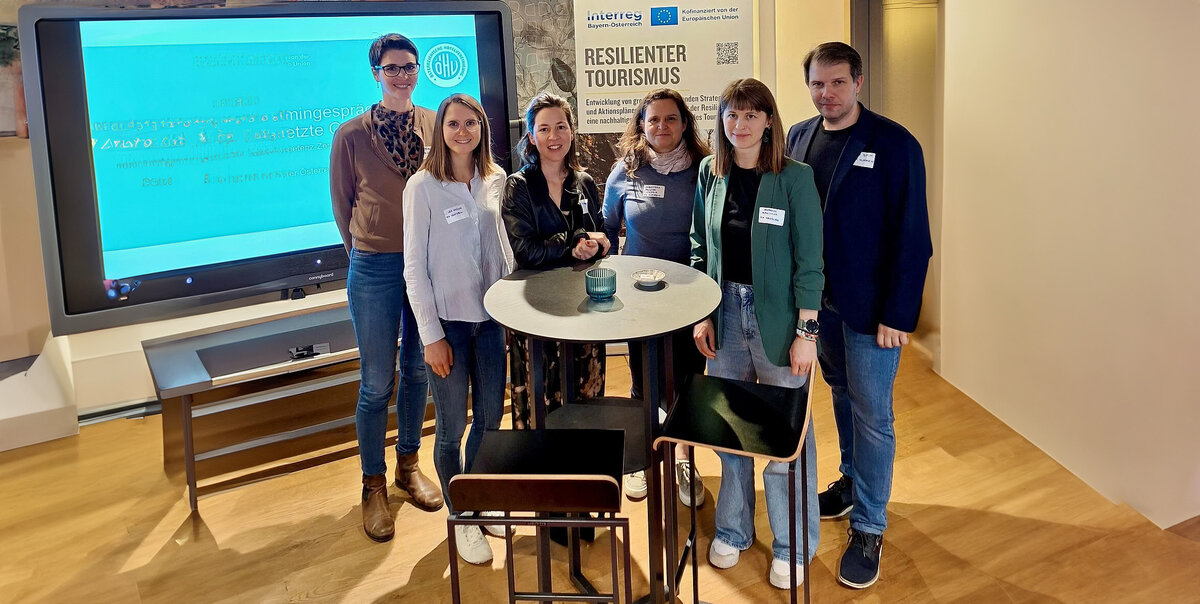Modern energy management for sustainable tourism
- 19.06.2025
- Research

The team behind the Interreg project Resilient Tourism consists of representatives from the University of Applied Sciences Kufstein Tirol, the University of Applied Sciences Salzburg, and the Austrian Hotel Association (ÖHV).
How can a connected hotel use energy more efficiently and save costs? And what does this have to do with a hotel without guests? At the 4th fireside chat in Oberschleißheim, the Resilient Tourism research project will focus on modern energy management systems and how guests can be actively involved in the concept.
The fireside chats of the INTERREG research project Resilient Tourism provide valuable impetus for the tourism industry. On 20. March 2025, the fourth of a total of nine meetings took place at the Hotel Competence Center in Oberschleißheim - a practical demonstration facility that, as a hotel without guests, realistically replicates a wide variety of hotel areas using state-of-the-art technology. Hoteliers and planners can find out about products and solutions from different manufacturers and experience innovations in live operation.
Christian Peter, CEO Managing Director of the Hotel Competence Center, gave a tour of the 3,500 m² show hotel, where hotel furnishings are presented in full working order. He also presented current developments in the field of energy management and showed how guests can be actively involved in sustainable energy concepts. For the 25 participating hoteliers and tourism professionals, the visit was much more than just an informational event—it became a concrete source of inspiration for future renovations and new construction projects.
ENERGY MANAGEMENT SYSTEMS: FROM MANUFACTURING TO HOSPITALITY
Electricity, heating, cooling, ventilation—all these components generate costs and CO₂ emissions. Many hotels are faced with the challenge of balancing rising energy costs with operational efficiency and guest comfort. During the fireside chat, it became clear that smart systems can be used to control and optimize these components in a targeted manner.
Just a few years ago, Energy Management Systems (EMS) were mainly used in industry. Today, the technology is increasingly being used in the hotel industry, where EMS can play a key role by making energy flows visible and identifying potential savings - from heat recovery to intelligent lighting control. This transparency creates a win-win situation that is not only economic but also ecological.
THE CONSOLINNO ENERGY MANAGEMENT SYSTEM
Consolinno has presented a concrete solution to this problem: its cloud-based energy management system offers a product that has been specially developed for the hotel industry. The system continuously collects data from various sources and analyzes it automatically. Through the intelligent linking of electricity, heating, and mobility systems - such as photovoltaic systems, heat pumps, and smart charging management for electric vehicles - as well as AI-supported control, hotels can improve their energy consumption in a targeted manner, reduce CO₂ emissions, and lower operating costs.
What's particularly exciting is that the Hotel Competence Center and Consolinno are not only focusing on technology, but also on participation. Employees and guests are to be involved in energy issues—for example, through visible real-time data that raises awareness of their own consumption.
The discussion made it clear that technological innovations form an important basis for enabling sustainable solutions. However, acceptance and reflection by users are just as crucial for success—only together can technology and people unleash their full potential.
Links:
- Hotel Competence Center | Website
- Resilient Tourism | Research Project
- ÖHV review of the 4th fireside chat | Website
